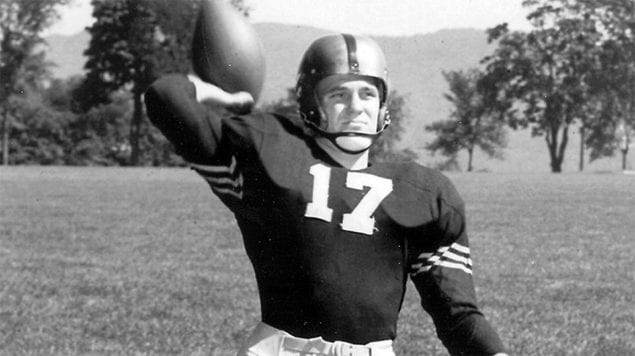
As we enjoy the beginning of a new football season, local fans take pride in three teams which earn our allegiance in South Florida: the NFL Dolphins, the Miami Hurricanes and the FIU Golden Panthers. Not many cities across the USA can make that statement. Only Los Angeles, with the professional Rams, Chargers and college teams USC and UCLA, has more.
Long before the mighty NFL laid claim as “the national pastime,” baseball had our undivided sports attention. During the 1940s, about the only football sports fans followed closely was college football. The NFL had but nine teams; there was no professional football in the South or west of the Mississippi, no Super Bowl and very few games on TV. If you had a favorite team back then it was likely Notre Dame, Michigan or that school not far from New York City, the United States Military Academy – better known as West Point, Army or their colorful nickname the Black Knights of the Hudson. Army was the national champions during the war years 1944 and 1945. They were unbeaten in 32 consecutive games from 1944-1947. Notre Dame was just as and maybe a little better. The Fighting Irish were the number one team in 1946, ‘47 and ‘49 and never lost a game during that time (38-0- 2). About the only time these two giants ever lost a game was when they played each other. One year, neither team won – or scored. And one of the young men who had a lot do to with the outcome of that game in 1946 is who I’d like you to meet now.
He’s a hometown boy from Miami, a big star at Miami High, an All American at Army and won the Sullivan award for best amateur athlete in 1946. His name is Lt. Col Arnold Tucker (U.S. Army ret.); he is 94 years old now, and we can all be proud of him.
As one of the stars of the Stingaree teams in the early 40s, Tucker teamed with Pete Williams and led Miami High to dominance in football and basketball. Tucker went on to play for the University of Miami in 1943 and then enrolled at West Point.
College football rules were liberalized during World War II and players were allowed to transfer schools in order to undergo military training while awaiting the draft. And, they could play immediately without having to sit out a year. The Army team, with its strong military tradition, stocked its squad with talented players from different universities.
Tucker quickly made the squad, and by 1944 Army’s roster of star players included future Heisman Trophy winners Felix (Doc) Blanchard and Glenn Davis. Tucker was the backup QB on the ‘44 team which routed the Fighting Irish 59-0 and breezed through the season undefeated.
They were even better in 1945. The Black Knights played a tough schedule which included six ranked teams, drubbed Notre Dame 48-0, held their nine opponents to a mere 46 points and football analysts have often cited them as the greatest college team of all time. Tucker was one of the stars and Blanchard won the Heisman.
By 1946, both Notre Dame and Army were as strong as ever. The Irish returned a number of veterans of wartime service, including their renowned coach Frank Leahy. By mid-season both teams were unbeaten and met again at Yankee Stadium. The November game became known as the “Game of the Century.” 76,000 people attended the game, including General of the Army and future President Dwight Eisenhower.
There were four Heisman Trophy winners—two for Notre Dame (Johnny Lujack and Leon Hart) — on the field that day. But the player who made the difference was Miami’s own Arnold Tucker.
The final score was an unsatisfying 0-0. Notre Dame disdained several field goals and Army nearly scored when the powerful Blanchard broke loose on a long run and was headed for the Irish goal line. At the ND 35, Lujack made a diving shoestring tackle which stopped him.
Tucker played a big part in the outcome. He intercepted three Lujack passes to thwart Notre Dame drives.
After the game, a frustrated Frank Leahy confronted his star QB and asked him, “Why did you keep throwing the ball to Tucker?”
“Coach, he was the only one open.”

About the Author
Bob Goldstein is a retired broadcaster and advertising executive who has lived in South Florida for more than forty years. He is a veteran political activist (dsdcfl.org) and a member of the South Florida Writers Association. If you would like to comment on Bob’s columns, send your response by email to robertgrimm62@yahoo.com.






